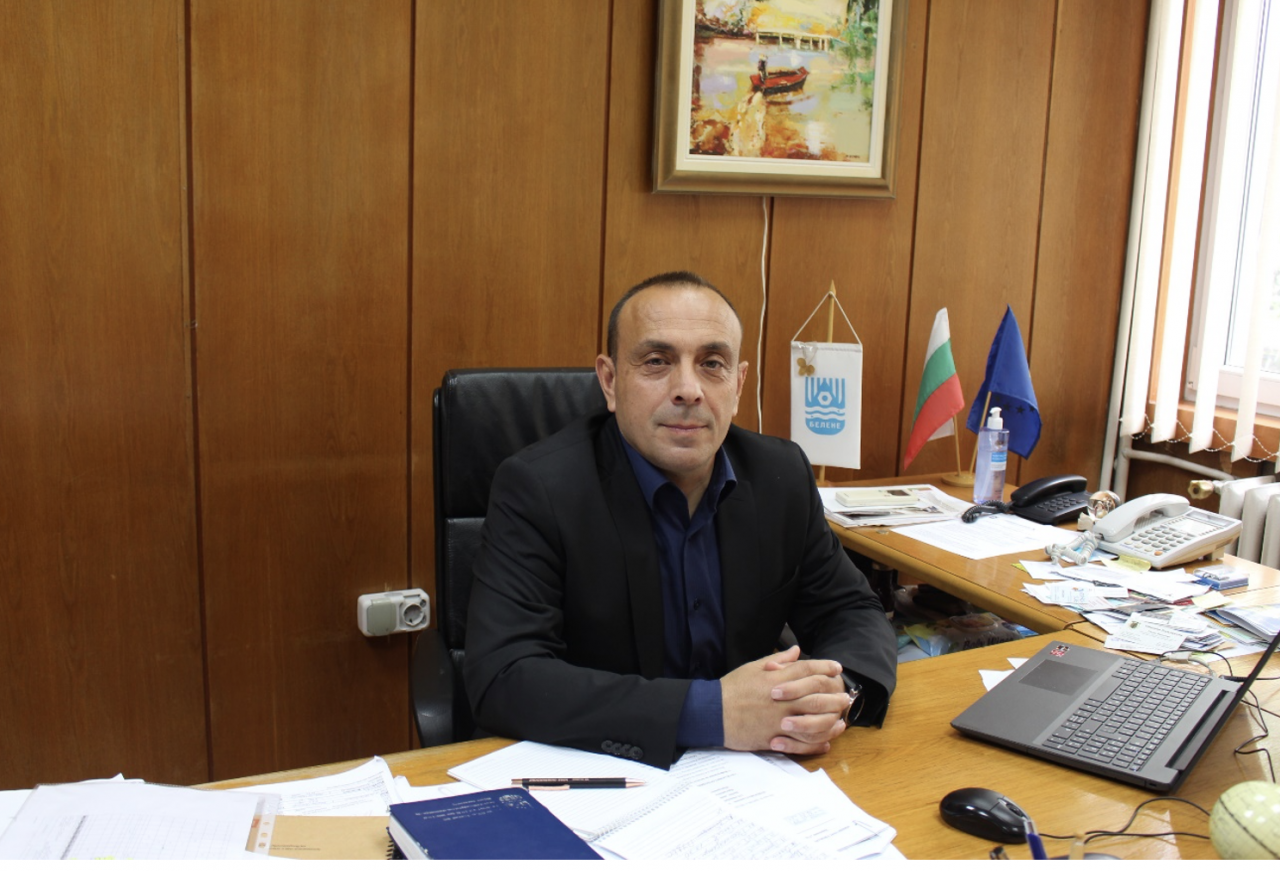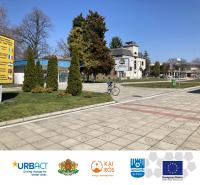
Heritage-led urban regeneration involves major urban projects requiring significant investment. Political backing and direction are therefore key to attract resources and align necessary contributors and stakeholders.
This is a series of short interviews conducted by KAIRÓS lead expert and TASO principal Miguel Rivas with Mayors and elected representatives from the URBACT network KAIRÓS Heritage as Urban Regeneration.
Miguel Rivas: A pleasure to see you again Mr. Dulev. Belene is joining the Kairós network with the aim to promote a type of waterfront redevelopment project by activating a number of natural and cultural heritage assets. What can you tell us about this vision?
Milen Dulev: It is also a pleasure for me to meet you again, Mr. Rivas. On the territory of the Municipality of Belene these resources are unique, not only for Bulgaria, but I would also say in regard to Europe’s natural and historical landmarks. Here we have the only preserved ancient Roman customs in Europe - the Military fort "Dimum". The principia found in this building were the headquarters of the Roman guards. What makes it unique is that it features two floors; the only similar building with such a purpose has been found, for now, in Egypt. On the Persin island, the largest island in the Bulgarian part of the Danube, a labor camp was built in the past, where all political opponents of the communist totalitarian regime were imprisoned and were forced to live and work under very harsh, inhuman conditions. During its entire existence from 1949 to 1959, over 30.000 people were taken prisoner and hundreds went missing or died. No exact data are available as the original archives of the camp administration have not been preserved. The remains of the camp buildings are the only surviving witnesses of the communist regime camps in Bulgaria and this makes the Park-Memorial to the Victims of Totalitarianism on the Belene island (Persin) unique not only for Bulgaria but also for Europe. And, last but not least, the town of Belene houses the administrative building of Persina Nature Park. The park itself with its fauna and flora is unique for Bulgaria and is the only one along the Bulgarian Danube. The park also includes the Belene Danube archipelago that consists of 19 islands and is the largest in the Bulgarian Danube river valley. With their pristine beauty, they are very attractive to ecotourism enthusiasts and conservationists. Everything I have mentioned so far is only part of the natural and historical resources that the city of Belene and the Belene Municipality is proud of and intends to use as a basis for the development of various types of tourism and to offer a unique tourist product for our country and, why not, for all of Europe. The sites, which I mentioned are located on the banks of the Danube, it is the river that unites them and for this reason my efforts as Mayor of Belene Municipality and the entire Municipal Administration are aimed at building a Danube Park, which will unite them and make the spaces between them an attractive place for recreation and entertainment. In addition to the construction of pedestrian and bicycle lanes, parking lots and places for recreation, we plan to use the area for various cultural events. Our goal is to make it an attractive place for all citizens and visitors of the town of Belene. The KAIRÓS project and our participation in it are an ideal opportunity for us as a town, not only to advertise our project, but also to gain experience from other partner cities. To see how they plan to use their cultural heritage as а driving force for sustainable urban development and regeneration.
Miguel Rivas: In Bulgaria, the name of Belene is associated to the construction project of a nuclear power plant, which has been postponed over and over again. So, to some extent, I see your participation in a project like Kairós as an attempt to create your own agenda, independently of the national government plans for your city. Do you agree?
Milen Dulev: On the territory of the Belene Municipality there are two sites of national and international importance. As you have already mentioned, one of these projects is for the construction of a nuclear power plant that for economic and political reasons, has already been stopped twice by the governments of the Republic of Bulgaria. The site of the Future Nuclear Power Plant is located at 5 km. from the town of Belene, and includes a built infrastructure and equipment for two nuclear units. Less internationally known is the other project, which construction also began in the 1970s. This is the Hydrotechnical Complex Nikopol - Turnu Magurele (Belene - Choara), a joint project between Romania and Bulgaria, which was planned to be built on the Danube River. But again, for economic and political reasons, it was stopped for construction. So, it is quite in order that the entire economic and social development of the town is directly related to these unrealized projects and especially to the project for the construction of the Nuclear Power Plant. All this has led to some negative trends for our city, such as a decrease in the working population not only in the town of Belene, but also in the villages and has affected the entire region. As I have already mentioned several times, our Municipality has unique natural and historical landmarks, not only for Bulgaria, so in recent years my ambition as mayor of Belene Municipality is to make full use of this for the development of our city in another direction, different from those national projects, to ensure the sustainable development of our town.
Miguel Rivas: I remember my first visit to Belene also attending the launch meeting of your URBACT Local Group, and how impressed I was by the fact that you the Mayor was there not only to welcome the ULG members but to facilitate the whole meeting till the end. How do you see the role of a Mayor in a type of URBACT action planning process?
Milen Dulev: We are a small Municipality, but my character is such that I am always up to date with what is happening in the city and the Municipality. I am always ready to help or assist anyone who wants to help the development of our city and municipality. The role of the mayor is to provide not only support, but also where it is necessary to take an active part. The URBACT program and KAIRÓS are interesting and different from other programs and projects financed by the European Union in which the Municipality of Belene participates. The process of planning actions under the program suggests the involvement of various stakeholders, the role of the mayor, in my opinion, is to facilitate and support the communication between national and municipal institutions on the one hand with business representatives and citizens on the other hand. The good interaction between the various institutions, public or private, together with the citizens is of key importance for the realization of each project.
Miguel Rivas: Usually, small and medium-sized towns like Belene lack of financial capacity to promote and develop major urban regeneration projects by themselves. Talking about funding and regarding the Danube Park project, how do you intend to involve both national and regional authorities?
Milen Dulev: The idea for the construction of the Danube Park has been around for many years, this is the great desire of our citizens. For me, this is also a personal cause, so my efforts and those of the Municipal Administration are focused on finding funds to finance this project.
A project for strengthening the banks of the Danube River is currently being implemented in the part where the park will be built, financed by the European Agricultural Fund for Rural Development and the Bulgarian Ministry of Agriculture. The development of the park is included in the Strategy for development of tourism in the Municipality of Belene, which is part of the Plan for the integrated development of the Belene Municipality for the period 2021 - 2027. The development of the park is included in the Strategy for Tourism Development in the Belene Municipality, which is part of the Plan for Integrated Development of the Municipality of Belene for the same period. This significantly will require support of the regional and national authorities to implement the project as well as when we apply for funding under national, cross-border and European programs. We are working actively to attract not only funds for the implementation of the project for the Danube Park, but also to mobilize local businesses and the citizens of Belene town to take an active part in its implementation.
Miguel Rivas: It is the first time Belene joins a URBACT project. Now that we are halfway through the Kairós action planning network, what is your initial impression about the URBACT Programme?
Milen Dulev: That's right, Belene municipality is participating in the URBACT program for the first time. The KAIRÓS project gives us the opportunity via the organized webinars and thematic seminars to gain experience not only from our partners, but also from other European cities, how they deal with the problems related to urban regeneration, the conclusions they have reached, how to most effectively use the urban heritage for the sustainable development of cities. Simultaneously with the formation of the Local URBACT Group and the participation in it of all stakeholders, such as municipal and national institutions, local businesses and citizens, their training and participation in the writing of the Integrated Action Plan and its further realization, will contribute in the future this energy should be used to implement other projects and to solve problems in the development of our city. I personally attended the meeting of the Local URBACT Group, held on April 26, 2021, and I was impressed by how people from different institutions and citizens worked together and how interesting it was for them. They were satisfied with the work they did together. I take this opportunity to thank you Miguel and also to Ms. Anke van Wijck, for your help and support to our project team. In conclusion, I could say that for me and the project team, KAIRÓS is an exciting experience and we would be happy to participate again in future URBACT projects.


